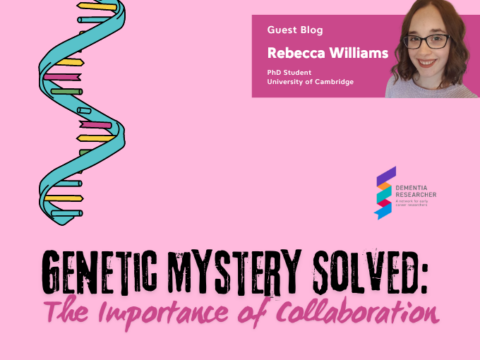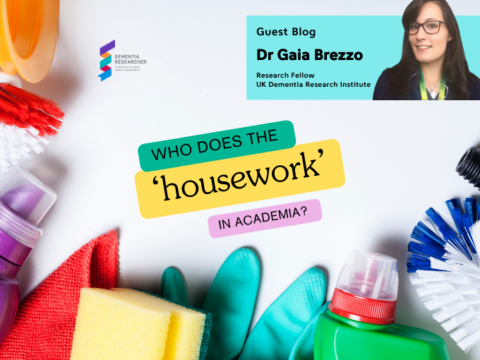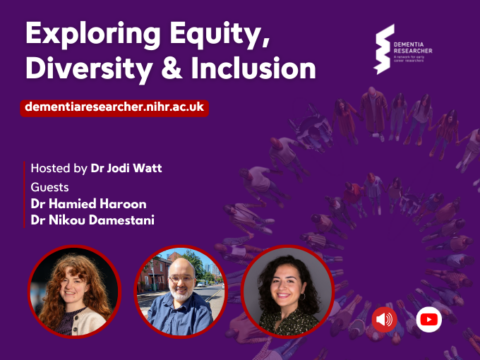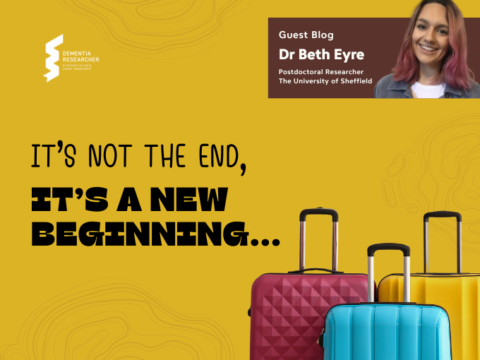When I finished my PhD, I wished I hadn’t done it. Or, I guess, a bit more strongly than that – I thought it had ruined my life. I thought it taught me nothing, instead giving me a myriad of mental health issues and a grand total of zero publications – a known marker of abject failure (I hope you can sense my sarcasm and how hard I rolled my eyes here). It took away a lot of what I knew myself to be and left me facing an endless blank canvas. Or a dead-end, which requires backpedalling far into the past (say, I don’t know, to prior to starting the PhD..) to change course to something that would allow me to ‘fix’ what the PhD had ‘broken’.
Not to put the cart before the horse in the telling of this story, but I don’t feel this way anymore. However, it was a long journey to get to this point. It took a fair bit of time, but it wasn’t particularly effortful, which is always good if you’ve spent the last three years of your PhD in a state of perpetual burnout. Also, when you think a life experience has done nothing for you, the only way is up…right?.. Right?!
We don’t really talk about this in academia, particularly when the experience of the PhD was poor but you ultimately still achieve the degree, because that was the ‘sole’ goal and you’ve accomplished it, yay! This was my situation, but I felt fraudulent, self-doubting, an imposter, all the negative self-focused words you could think of, but none of the more rationalised acknowledgements that perhaps the academic environment I was in had harmed me. Because that was too painful, too real, to have committed five years of my life to something that left me a shell of who I had previously recognised myself to be.
So, let us talk about some of that pain and the path to today.
Before I start properly, if you’re reading this thinking ‘well this is a bit of an overshare!’, you know what, maybe it is. But I would challenge you to reflect on why you view it that way, and why you feel uncomfortable about discussion of mental health in academia. Academia should not be a masquerade full of people struggling beneath the surface but feeling pressured to never discuss these issues, but yet all too often, that’s exactly what it feels like.
The viva was the best part of my PhD. The thing that everyone fears, was the absolute best part. Other than the fact that I’d lost my voice the day before, and rather than a last-minute cramming session (which admittedly isn’t my style anyway), I spent the day on an aggressive regimen of Fisherman’s Friends and panic attacks. The panic attacks are something I thought were normal. Let us just sit together in that for a bit – I had so many during my PhD (despite never having had a single one before that) that, despite working in a medicine-adjacent field, surrounded by a lot of medics, I thought that that was a normal aspect of doing a PhD. I knew so many other PhD students who experienced the same, that I just took it as corroboration of what I was experiencing. Anyway, the viva – the viva was actually good, exactly what you’d want it to be, a thoughtful discussion in which you manage to hold your own, with a few tricky questions thrown in.

Engaging in hobbies and creative activities is a way to maintain a sense of freedom and personal fulfilment outside of professional obligations.
But then, that was kind of it. I had minor corrections, and I did those very quickly with the momentum I had from preparing for the viva, but then I was staring at the shattered remnants of every other aspect of my life. Great. I don’t remember much of the aftermath of my PhD, other than for my day-to-day job. External to that, and therapy, I couldn’t really tell you what I did for the best part of a year, other that relentlessly use my new Dr title (some days, the only thing that got me through my PhD was my desire for that sweet, sweet gender-neutral title), but otherwise tried my best to ignore every memory of the process. I couldn’t acknowledge my PhD experience for a long time, but I learned to get to a place of viewing it in a better light by essentially rebounding from the most unhealthy relationship of my life – me and my PhD – to a new relationship with myself.
When you don’t recognise who you are at all at the age of 28, other than now being a Dr (because that’s all every waking hour of the past 5 years has been leading up to), it’s hard to know which straws to grasp to claw your way back to some semblance of understanding who you are. If I had to categorise how I did so, I guess that I slowly began to focus on the areas of my own life where I saw the biggest negative changes during the PhD, and work on trying to fix those. By myself, or with professional help where I thought it necessary or started to struggle. The more I improved these aspects of my life, the more I realised how much better I was at doing these things (none of which were directly related to science) than I would have been prior to the PhD. I’ve included a few examples below:
 A healthier relationship with eating and exercise. I’m sure this one will be at least somewhat relatable to many of you. When you’re busy on your thesis or experiments, time to make healthy meals from scratch or go to the gym becomes non-existent. It takes certain cognitive dissonance to work in the world of health and ignore your own, and yet during my PhD I had that in spades. “No more” said Jodi, on 8th December 2021 (one day post-viva). It has been slow, and it has been way too similar to those ‘PhD progress: expectation vs reality’ graph memes for my liking, but this (combined with point 2 below) has been a critical foundation for starting to move on from the damaging environment. And how did I do it? Annoyingly, with a very similar Gantt chart setup to that that I used in my PhD for monitoring the progress of my ever-changing PhD topics…thanks, PhD!
A healthier relationship with eating and exercise. I’m sure this one will be at least somewhat relatable to many of you. When you’re busy on your thesis or experiments, time to make healthy meals from scratch or go to the gym becomes non-existent. It takes certain cognitive dissonance to work in the world of health and ignore your own, and yet during my PhD I had that in spades. “No more” said Jodi, on 8th December 2021 (one day post-viva). It has been slow, and it has been way too similar to those ‘PhD progress: expectation vs reality’ graph memes for my liking, but this (combined with point 2 below) has been a critical foundation for starting to move on from the damaging environment. And how did I do it? Annoyingly, with a very similar Gantt chart setup to that that I used in my PhD for monitoring the progress of my ever-changing PhD topics…thanks, PhD!
 A greater capacity for self-advocacy. My ability to advocate for myself in an academic context is excellent and was directly borne from my PhD circumstances. After my PhD experience, I was either going to entirely leave academia, or I was going to work in an academic environment which – dare to dream – benefitted me as both a person and a scientist. I have that now, and I really enjoy what I do, but the real superpower of my self-advocacy is knowing (and I mean, truly knowing, not “I know that’s possible, but I never will”) that I can just leave. During my PhD, leaving was touted as the worst possible thing anyone could do, the epitome of failure, career suicide, never employable again, not just in academia but in any job ever. Flicking a switch in my brain to know that, even if I am not a Nature-paper producing scientist, science needs me (a queer and neurodiverse person) and I don’t need it, is an absolute gamechanger and like cushioning my mental health from the throes of academic politics. Incidentally, I know self-advocacy is hard, so I wrote a blog post about it.
A greater capacity for self-advocacy. My ability to advocate for myself in an academic context is excellent and was directly borne from my PhD circumstances. After my PhD experience, I was either going to entirely leave academia, or I was going to work in an academic environment which – dare to dream – benefitted me as both a person and a scientist. I have that now, and I really enjoy what I do, but the real superpower of my self-advocacy is knowing (and I mean, truly knowing, not “I know that’s possible, but I never will”) that I can just leave. During my PhD, leaving was touted as the worst possible thing anyone could do, the epitome of failure, career suicide, never employable again, not just in academia but in any job ever. Flicking a switch in my brain to know that, even if I am not a Nature-paper producing scientist, science needs me (a queer and neurodiverse person) and I don’t need it, is an absolute gamechanger and like cushioning my mental health from the throes of academic politics. Incidentally, I know self-advocacy is hard, so I wrote a blog post about it.
 Saying yes where the PhD time constraints made me have to say no. Now, it’s me first. Not my family, or my job, me. Not in a bad way, rather in a knee-jerk reaction to horrendous circumstances and the affirmations from the outside-academia world that that is normal and academia is the strange one. In my work hours, I give my all to my job, and I accept that I might need to give a bit more when there’s a tight deadline. These deadlines are predictable and can be planned for, however, and so I do. I work my assigned hours, and then the rest of the time is for me and my family. For me to do my strange hobbies and feel creatively free, not for me to worry about only having submitted two abstracts to a conference when I could have submitted three.
Saying yes where the PhD time constraints made me have to say no. Now, it’s me first. Not my family, or my job, me. Not in a bad way, rather in a knee-jerk reaction to horrendous circumstances and the affirmations from the outside-academia world that that is normal and academia is the strange one. In my work hours, I give my all to my job, and I accept that I might need to give a bit more when there’s a tight deadline. These deadlines are predictable and can be planned for, however, and so I do. I work my assigned hours, and then the rest of the time is for me and my family. For me to do my strange hobbies and feel creatively free, not for me to worry about only having submitted two abstracts to a conference when I could have submitted three.
 Sewing. Yes, it’s maybe a bit of a rogue one on this list, but sewing has always been a big part of my family life. My mum has now sewn for 60+ years and is in the process of helping me make my wedding dress. I couldn’t really get my brain around sewing before my PhD, specifically taking something 2D (the fabric) and making it 3D (the piece of clothing). It’s something that still blows my mind, but I get it now, I can understand the construction in 3D. I’m almost certain this is exclusively due to how many 3D MRI scans I looked at over the course of five years. There’s still a bit of language to traverse between my mum and I here though, apparently I need to stop referring to clothes in axial, sagittal and coronal planes..
Sewing. Yes, it’s maybe a bit of a rogue one on this list, but sewing has always been a big part of my family life. My mum has now sewn for 60+ years and is in the process of helping me make my wedding dress. I couldn’t really get my brain around sewing before my PhD, specifically taking something 2D (the fabric) and making it 3D (the piece of clothing). It’s something that still blows my mind, but I get it now, I can understand the construction in 3D. I’m almost certain this is exclusively due to how many 3D MRI scans I looked at over the course of five years. There’s still a bit of language to traverse between my mum and I here though, apparently I need to stop referring to clothes in axial, sagittal and coronal planes..
 Planning a wedding. If you asked me when I was finishing my PhD or just after, the one good thing that I got from it was my partner. And now, we are having our civil partnership later this year! It turns out, when you do a PhD effectively in crisis mode for several years, and your final thesis reflects research plan H as opposed to the A, B or C that you hoped it would be, wedding planning is a breeze. Venue? View two, pick the first. Band? A quick google away. Rings? Another google. We planned the vast majority of our wedding in less than a weekend. Indecision is – largely – a thing of the past, another win for the PhD!
Planning a wedding. If you asked me when I was finishing my PhD or just after, the one good thing that I got from it was my partner. And now, we are having our civil partnership later this year! It turns out, when you do a PhD effectively in crisis mode for several years, and your final thesis reflects research plan H as opposed to the A, B or C that you hoped it would be, wedding planning is a breeze. Venue? View two, pick the first. Band? A quick google away. Rings? Another google. We planned the vast majority of our wedding in less than a weekend. Indecision is – largely – a thing of the past, another win for the PhD!
The progress in these areas (and some others that I won’t share here as they’re very much still in the work in progress stage) taught me that maybe, just maybe, I did learn something after all. Beyond that, and with time, I have been able to reflect back on my PhD experience – with the help of a lot of therapy – and identify exactly what it is that I learned and now know. I used this knowledge every day in my post-doc, but if you had asked me directly to tell you what exactly I had learned, I wouldn’t be able to tell you because I was entirely unable to recognise it in myself.
This is an interesting blog post for me to try and sum up, because I very much feel as though I am only part way through the process of repairing myself after my PhD. I’m not sure of the take-home message, because I am not ‘home’ to who I was before, and not 100% there with accepting that I will never be back in time, able to make a different decision. My hope is that this resonates with absolutely none of you reading this, because that would likely mean that your PhD looked better than mine, and that the vast majority of what I experienced was an anomaly and sheer dumb luck. But, I also know how much I would have gained from having someone share such an experience as I was going through the same, and how much it would have meant to me. It feels likely that one of your key takeaways is more likely to be that I am not cut out for academia, which feels a reasonable assumption given that I am not sharing much in the way of details surrounding the ins and outs of what all happened during my PhD, in large part because I am still processing. But also, we often don’t talk about PhD issues, at least in the individual way, for fear of repercussions coming back directly to us, and I am not immune to this. I recognise now that I should have quit my PhD, but that idea is better saved for another blog, and probably not one written by someone who didn’t follow that advice. All I can say though, is that I am now so glad I didn’t, and am now in an academic environment where I can thrive, which is yet more proof for me that academia doesn’t have to be the way it looked for me previously. The behemoth that is academia looks so negatively at the idea of failure that I almost lost myself trying to prove that I wasn’t one. Compassion is not really at the forefront of the academic juggernaut, but had I seen a bit more from some of those around me, I’m in no doubt that my mental health would have been in a better place. Perhaps it’s time that we consider having a compassionate workplace to be as important as we consider oft-touted, poorly-worded/mental health insensitive academic ideals, such as ‘publish or perish.’
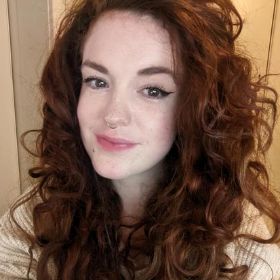
Jodi Watt
Author
Dr Jodi Watt is a Postdoctoral Researcher at University of Glasgow. Jodi’s academic interests are in both healthy ageing and neurodegenerative diseases of older age, and they are currently working on drug repurposing for dementia. Previously they worked on understanding structural, metabolic and physiological brain changes with age, as measured using magnetic resonance imaging. As a queer and neurodiverse person, Jodi is also incredibly interested in improving diversity and inclusion practices both within and outside of the academic context.

 Print This Post
Print This Post
